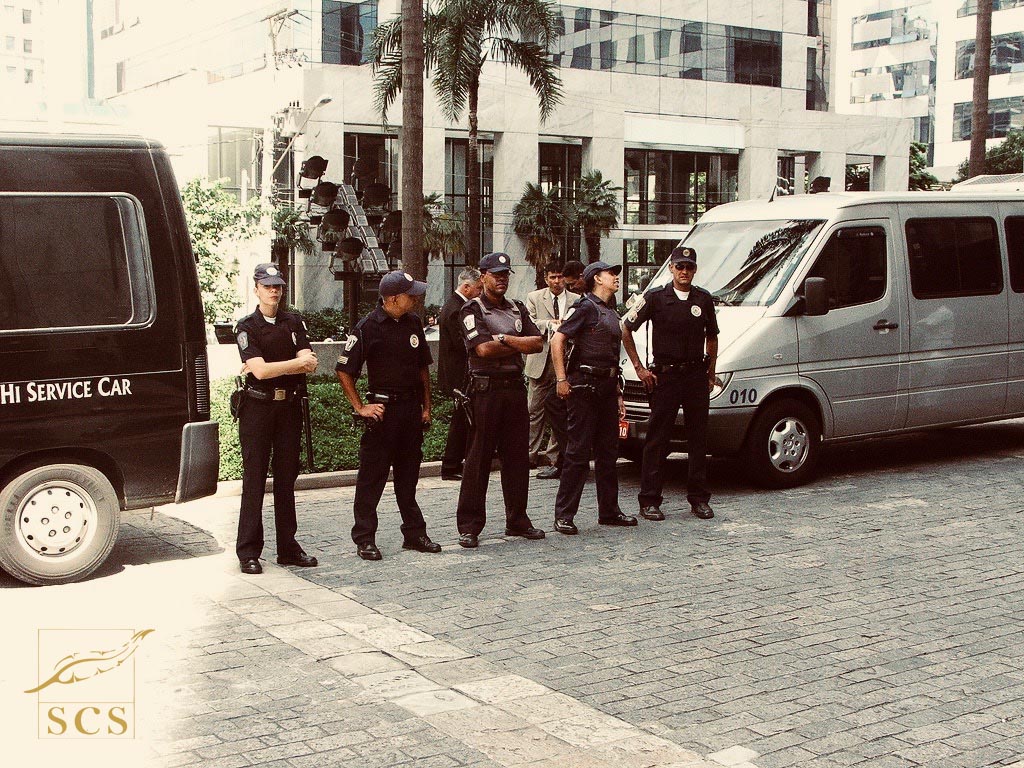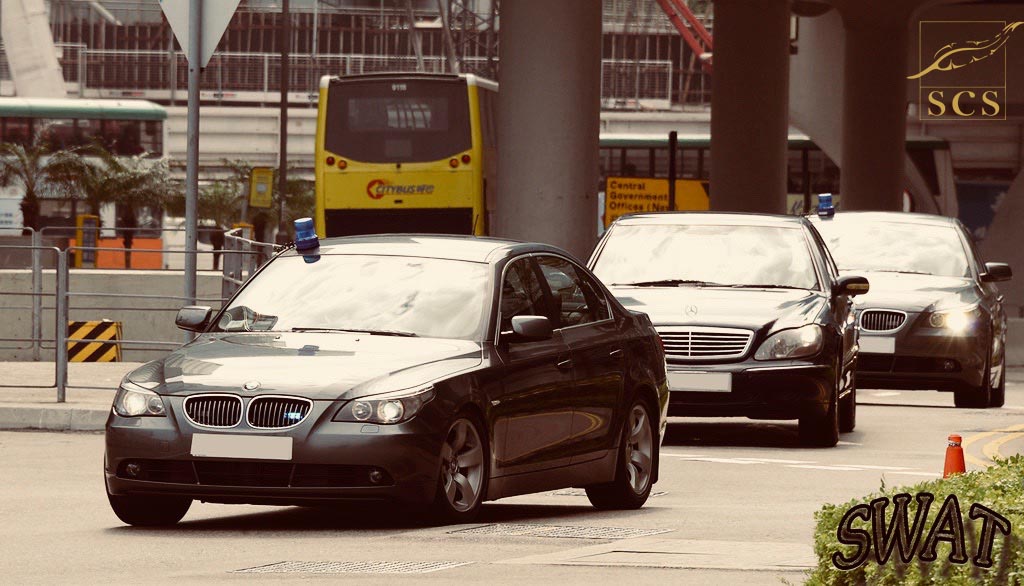Statistically speaking, as many as 95% of kidnappings take place between the home and the office. Even if you are driving in an armored vehicle, the need for alertness should be ever-present. Secure transportation services aim to reduce the risks and predict the threats that principals ― i.e., the person being protected ― may face daily.
Preparing for any protective detail is a demanding task for executive protection professionals. Although clients usually don’t notice the effort that goes into advance work, they will invariably suffer the consequences if something goes wrong. For this and other reasons, we suggest that clients be on the lookout for those EP firms specializing in seamless secure transportation services.
Safe transport is a lot more than merely arriving from point A to point B. It is the method and plan to successfully relocate the principal from one safe place to another secure site while ensuring proper protection along the way. Especially along the way.
Companies like SCS offer a wide range of the mentioned services, including but not limited to:
- Transportation planning,
- Journey management,
- Hotel security assessment,
- Emergency training,
- Medical support, and
- Threat, vulnerability and risk assessment.
At face value, driving from one spot to another seems like a harmless everyday duty that doesn’t even make it into the top five responsibilities. Nevertheless, there is a lot that goes into preparing secure travel for a principal.
Thus, this article will serve as your guide to explore the sensitive yet exciting field of secure transportation services. It is intended for all clients and principals who want to familiarize themselves with some vital aspects.

Transportation Planning and Journey Management
Inextricably connected, the process of planning and managing a journey spearheads the provision of secure transportation services.
As a rule of thumb, your executive protection detail will need to establish the routes you usually take and assess the entire course. Some of the information we suggest you provide to your EP team are as follows:
- Where you own property, in which cities, states, and countries,
- What are your social media or other public statements and announcements that you plan to publish soon or have already published, with an emphasis on geo-location posts, and
- Who will join you during business and family trips.
If experienced and professional, the protective detail members will ask these questions themselves immediately upon being hired.
In a nutshell, threat and journey management assessments entail information such as the number of travelers and their level of exposure to risks. Additionally, they may include local knowledge when traveling abroad.
Cars are much more sophisticated than they used to be, so it is necessary to know everything there is to know that could hamper a journey. Thus, another vital aspect of transportation planning is for your EP team to familiarize itself with different gadgets and buttons in the vehicle.
You can notice they didn’t do this when the protection specialist runs the battery down on the vehicle. This happens if they don’t know how to turn the lights off while waiting for you in front of a venue.
Pro-tip: Ask your EP team to provide you with detailed threat and journey management plans ahead of every trip.
Hotel Security Assessment
As with any assessment, this one must be a product of careful deliberation and fact-checking as well. If the hotel’s information to your EP detail turns out to be wrong upon arrival, significant issues may arise.
We urge your executive protection agents to contact:
- Local assets, contacts, or vendors,
- Security details, and potentially
- Local law enforcement.
This action will allow you to establish the actual situation in and around hotels.
In the time of COVID-19, it is imperative to look for health hazards that may endanger you and your entourage. For instance, if the hotel in question doesn’t have a high level of cleanliness, pick another and repeat the process.
Pro-tip: Ask your EP detail to ascertain the situation around VUIs, smart TVs, and other IoT wi-fi devices. They can be an enticing opportunity for malicious actors to listen in on you, ghost the hotel’s wi-fi signal or implement other surveillance and cyber attacks.

Emergency Training and Medical Support
The executive protection agents you hire should have at least a basic understanding of first-aid provision and related fields. What if attackers open fire on you, members of your family, or friends during an unexpected confrontation?
Even though this is an unlikely situation, you should be prepared for anything and everything. That is, your security detail ought to.
We definitely suggest having someone well-versed in the art of providing medical aid on the spot. Not only because attackers are lurking out there and waiting to target you but due to other vital aspects of medical support. These may include:
- CPR, AED, and airway ventilation,
- Pharmacological intervention,
- Conducting a primary assessment,
- C-collar and backboarding, and
- Medical and trauma emergencies.
Speaking of emergencies, your executive protection detail should inquire into your medical record and prepare accordingly for any health contingencies. Developing medical protocols and having logistics in place is insurmountably beneficial for you and your team at any time, not only in the course of business excursions.
Pro-tip: The single most important emergency medical skill for an EP guard is stopping the bleeding by using a CAT tourniquet, for instance. Second, understanding and combating dehydration and heat stroke are equally important.
Client Vehicles Are Usually Just Fancy Cars
We are astonished by how many security professionals miss the opportunity to advise their clients on obtaining adequately protected vehicles as opposed to only driving expensive cars. It may be because they feel insecure about discussing the topic due to a lack of knowledge. In other cases, EP agents simply go with the flow and oversee this part of their job.
Alternatively, a wealthy client may feel tempted to purchase a car just because they enjoy how it drives. Perhaps due to the appealing style or some other factors that seem essential for their comfort. However, we recommend following this equation to decide on the best secure vehicle: risk, client preference, security company recommendation/offer. Both the principal and the EP team will be better off for it if they consider this triangle.
Pro-tip: Expensive vehicles are not the same thing as protected and armored vehicles. The latter require an experienced secure driver due to the additional weight of the car. A standard ordinary chauffeur will not do, especially if they are not trained or employed to do that type of work. For instance, this person may lack the skills of evasive driving.
Summing up on Secure Transportation Services
Often also called security driving, secure transportation entails extensive knowledge and a steady level of skill to carry out route surveys, establish alternate-route plans, recognize and develop safe-havens, and develop emergency evacuation plans.
As we have established in this article, secure transportation is no walk in the park, and advanced first-aid competencies are imperative.
If you are still searching for the proper EP firm that could tip the scale in favor of your peace of mind during business or family travels, check out our offices nearest to you.
In conclusion, we firmly believe that secure transportation skills are not an add-on but rather a prerequisite to ensure the best possible protection that an EP firm has to offer.


November 25, 2021 Author Advanced Skills in Executive Protection: The Essentials SCS Solutions Ltd
[…] downplayed as an easy assignment, security driving has been gaining traction lately. Moreover, it is arguably one of the most critical advanced skills […]
March 1, 2022 Author Why You Need an Executive Protection Agent: The Big Reasons
[…] threats, crowd control, secure transportation, and many other segments of your daily life require a person who can handle it all. This […]